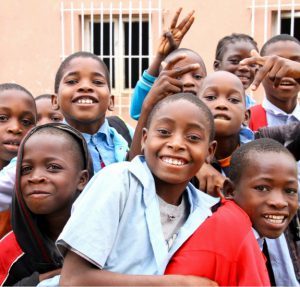Albertina eats bread with tea every morning for pequeno almoço, Portuguese for breakfast, then walks an hour to school. Occasionally, she skips breakfast and forages fruits on the way to class. Chances are slim that she will have lunch at all. She attends a primary school in Boane District, a 45 minute drive from Maputo, Mozambique, where we met her. As if it was something to hope for, not something to expect, she told us she liked the idea of “lunch at school because I will get a meal, and will go to class without feeling hungry.â€

The El Niño Drought was in full effect in August 2016 across Southern Africa. It was the worst drought in 35 years in this region, far removed from the world’s collective consciousness. An estimated 40 million people faced food insecurity, 23 million of whom needed urgent humanitarian assistance. Despite the considerable advancements in food security achieved by Southern African countries, sustaining those accomplishments remains a tenuous affair.
This plight compelled our three organizations — Rise Against Hunger, Adventist Development and Relief Agency and Islamic Relief USA — to form an alliance that August. Our aim was to join forces and bring sustained relief and recovery to the affected communities, to bridge the gap between short term response and leave space for the road to development.

We were painfully aware of the ruthlessness with which the drought indiscriminately affected children like Albertina. Our reports indicated children were skipping school, and in many instances, staying home to help their families by either searching for something to eat or working in the fields. Education is a gateway for many young children in this region to gain the knowledge and skills necessary to achieve their dreams. But because of the El Niño drought, many were powerless to do anything but watch their dreams evaporate.
Our organizations put forward an audacious plan: bold in its simplicity, complex in its execution. We wanted to increase the resilience of school-age children and improve their access to education. With that goal, we built the three-year and five-country El Niño Relief and Recovery School Feeding Initiative.
Each of us — Rise Against Hunger, Adventist Development and Relief Agency and Islamic Relief USA — brought our core expertise to the project with our long history of philanthropy.

Rise Against Hunger specializes in supporting school feeding programs with nutritious pre-packaged meals. Islamic Relief USA contributes its expertise in shipping gifts-in-kind. ADRA brings to bear its network of offices and extensive operational capacity throughout Africa, manages the school feeding initiative and liaises with national and local governments to ensure a successful coordination between key stakeholders. We depend on each other on the path to collective impact.
The project supports more than 48,000 primary school age students in Mozambique, Malawi, Madagascar, Swaziland and Zimbabwe each year. Through the initiative, more than 14,200,000 meals each year are distributed in more than 200 schools. So far, the school-feeding initiative proves to be critical in encouraging attendance, increasing enrollment and providing access to a balanced, nutritious meal to children affected by the El Niño drought.
The truth is, technical aspects and harsh reality aside, the school feeding initiative means Albertina won’t have to manage her hunger. She can concentrate on what’s most important: her education. She lights up when she talks about her favorite subject, Portuguese. She rushes through her chores at home, like helping her mother cook and wash dishes, so she can practice the language. She shares her enthusiasm for the language by teaching her siblings words she learns in school.

Albertina’s dream is to become an architectural engineer. We are ready to honor that ambition, by feeding her dream and the dreams of more than 48,000 other children across Southern Africa.
Partnership and Collaboration are...
 "
"
No Comments yet!